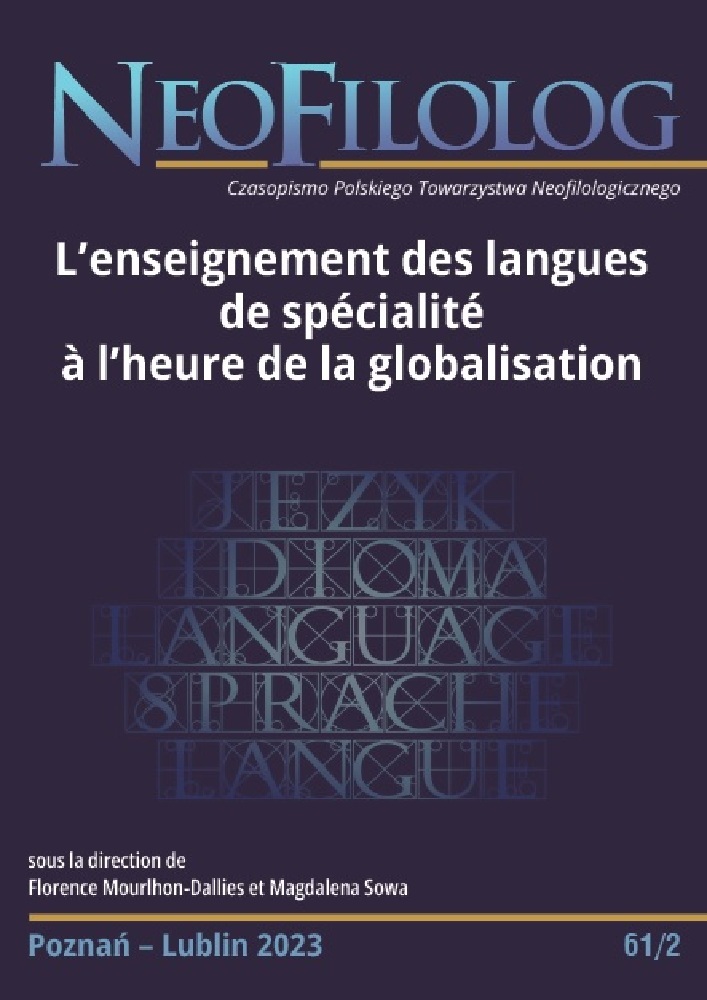Abstract
In the great upheavals of globalization, this article will focus on those who are not directly involved in this great movement. These include migrants. For them, the most useful language is that of survival, both social and professional. In this context, we will focus on the training demands that emanate from certain professional fields in France, formulated in the urgency of economic and human situations that concern the public employment actors, the training structures and of course the learners/workers themselves. Indeed, certain economic sectors are under pressure, in the sense that they are struggling to recruit. Recourse to migrant labour is therefore one of the solutions, but, in most cases, the question of mastering the language of the host country in oral and/or written form arises,. Didactic solutions must be found on a case-by-case basis, in a very precise and specific way. In order to describe and analyse this situation, the article will be based on two experiences of technical and linguistic training in two vocational training fields: i) catering and ii) building and public works.
References
Adami H. (2020), Enseigner le français aux adultes migrants. Paris : Hachette.
Adami H. (2021), Les formations linguistiques à visée professionnelle pour les migrants en France : orientations sociales et didactiques. « Langues, cultures et sociétés », Vol. 7, n°1, 4–12. En ligne : https://revues.imist.ma/index.php/LCS/article/view/26417/13997 [consulté 16.06.2023].
Boutet J. (2001), La part langagière du travail : bilan et évolution. « Langage et société », n°98/4, 17–42. DOI: https://doi.org/10.3917/ls.098.0017
Garcia D., Le Bras H. (dir.) (2017), Archéologie des migrations. Paris : La Découverte. DOI: https://doi.org/10.3917/dec.garci.2017.01
Manné I., Rousseau L. (2022), Les métiers en forte tension dans le Grand Est : des recrutements plus souvent en contrat stable. « Insee Analyses Grand Est », n° 152.
Mangiante J.-M, Parpette C. (2004), Le français sur objectif spécifique : de l’analyse des besoins à l’élaboration d’un cours. Paris : Hachette.
Mangiante J.-M., Parpette C. (2022), Le FOS aujourd’hui : état de la recherche en Français sur Objectif Spécifique. Bruxelles : Peter Lang. DOI: https://doi.org/10.3726/b19432
Medina C. (2014), Le français parlé dans les Bâtiments et Travaux publics : de l’analyse interactionnelle à la constitution d’un parcours d’apprentissage. Presses Académiques Francophones.
Mourlhon-Dallies F. (2008), Enseigner une langue à des fins professionnelles. Paris : Didier. DOI: https://doi.org/10.14375/NP.9782278069989
Sanders L., Bretagnolle A., Brun P., Ozouf-Marignier M.V., Verdier N. (dir.) (2020), Le temps long du peuplement. Tours : Presses universitaires François-Rabelais.
Schwartz Y., Durrive L. (2003), Travail et ergologie. Entretiens sur l’activité humaine. Toulouse : Octarès Editions.
License

This work is licensed under a Creative Commons Attribution-NoDerivatives 4.0 International License.
Authors
Authors of texts accepted for publication in Neofilolog are required to complete, sign and return to the Editorial team’s office the Agreement for granting a royalty-free license to works with a commitment to grant a CC sub-license.
Under the agreement, the authors of the texts published in Neofilolog grant Adam Mickiewicz University in Poznań a non-exclusive, royalty-free license and authorize the use of Attribution-NoDerivatives 4.0 International (CC BY-ND 4.0) Creative Commons sub-license.
The authors retain the right to the free disposal of the work.
Users
Interested Internet users are entitled to use works that have been published in Neofilolog since 2017, under the following conditions:
▪ attribution – obligation to provide, together with the distributed work, information about the authorship, title, source (link to the original work, DOI) and the license itself.
▪ no derivatives – the work must be preserved in its original form. Without the author's consent, it is not possible to distribute the modified work in the form of translations, publications, etc.
Copyrights are reserved for all texts published since 2017.
Miscellaneous
Adam Mickiewicz University in Poznań retains the property right as a whole (layout, graphic form, title, cover design, logo etc.).
